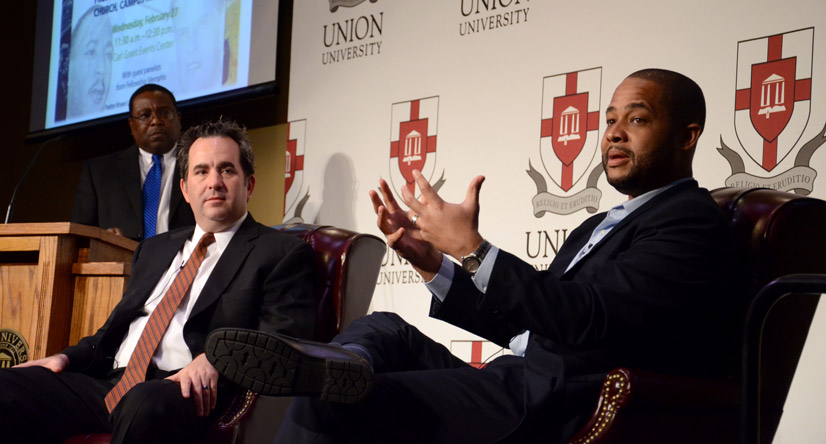Issue: Spring 2013 | Posted: March 18, 2013
Black History Month Symposium focuses on worship and race
By Alana Hu ('14)

John Bryson and Bryan Loritts (right) speak during a panel discussion at the sixth annual Black History Month program.
Bryan Loritts and John Bryson are leading racial reconciliation efforts in what is regarded as the second most segregated city in America.
Fellowship Memphis is growing as a multicultural church. Loritts is lead pastor; Bryson is the church's teaching pastor. They share the compelling goal of teaching the gospel in a setting that bridges the racial divide so evident in Memphis and other cities across the country.
Both shared thoughts about their mission during Union's sixth annual Black History Month program. This year, the program involved a panel format moderated by Frank Anderson, director of the associate of divinity program and associate professor of missions and ministry at Union's Stephen Olford Center in Germantown.
The event was sponsored by the Vocatio Center for Life Calling and Career and the MOSAIC student organization.
Loritts and Bryson focused on the theme "From Every Tribe: A Dialogue on Church, Campus and Community," as they addressed the diverse audience of black, white and Latino students, faculty, staff, local and state leaders of the National Association for the Advancement of Colored People and other members of the Jackson community.
"We felt that we could ignite hope," said Bryson, "If in the second most segregated city of America, a gospel-preaching, Bible-teaching, disciple-making church erupted, that was made up of multiple ethnicities and bringing African-Americans and whites together, it would be bigger than itself and remove excuses from other cities [to reconcile races.]"
The idea to form such a church came from Bryson, who felt compelled to bridge the racial gap and bring races together.
"Ninety percent of African Americans are in African American churches,'" Loritts said, "and only 25 percent of churches are classified as multi-cultural churches, which really shocked me from an African American's standpoint."
As a Southern city with involvement in the civil rights movement, Memphis has played a key role in black history. Loritts and Bryson said they recognize that through their work, they could create something monumental and historic in Memphis.
"By God's grace, we want to rewrite the narrative of Memphis over the next four years," Loritts said. "We continue to pick our leadership by looking for someone who has high cultural intelligence and can push their white or African American brothers and sisters without running them over."
Through their work, the men said they hope other churches will get a vision for similar action.


 The Mosaic Gospel Ensemble sings at the chapel service which preceded the symposium.
The Mosaic Gospel Ensemble sings at the chapel service which preceded the symposium.